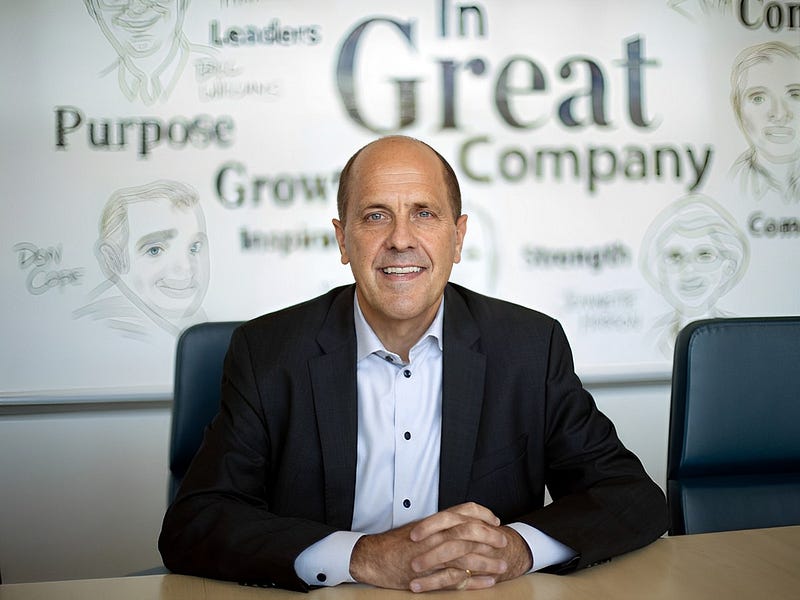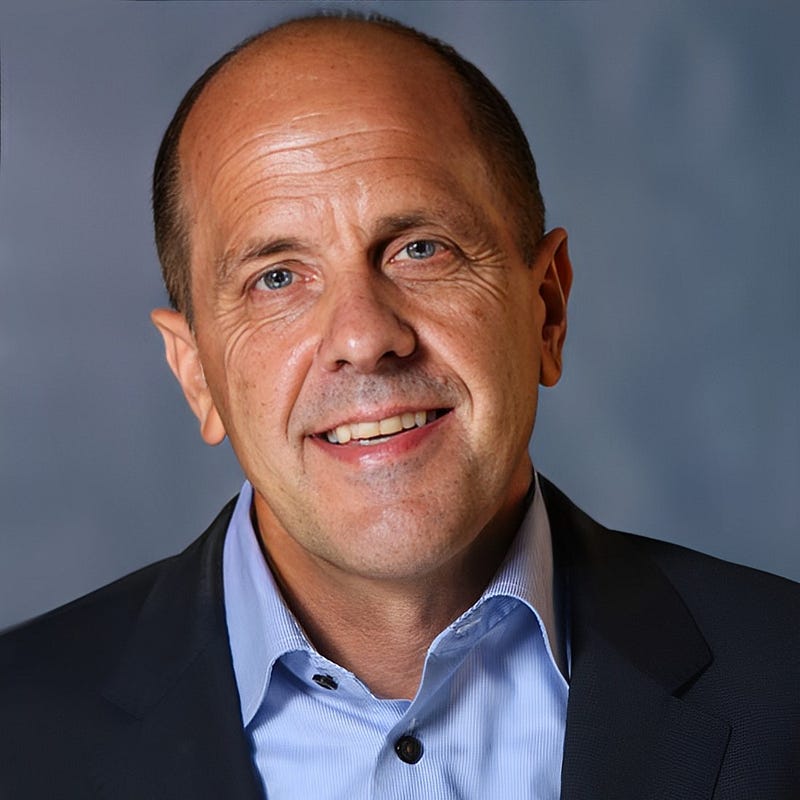Listen. Coaching goes sideways when coaches have their own confirmation bias: They believe something and they try to take people down that path. Great coaches keep an open mind and avoid making assumptions.
The number one leadership initiative in any organization today is improved coaching. Coaching empowers employees, empowerment drives engagement, and engagement drives performance. At its core, coaching is about transformation. Leading distributed teams requires transforming how we coach and changing our play calls and playbooks to get things done. As a part of our interview series called “Moving from Command & Control to Coaching & Collaboration; How Leaders and Managers Can Become Better Coaches,” we had the pleasure to interview Sam Reese.
Sam Reese is CEO of Vistage, the world’s largest CEO coaching and peer advisory organization for small and midsize businesses. Over his 35 year career as a business leader, Sam has led large and midsize organizations and has advised CEOs and key executives of companies all over the world.
Thank you for joining us to explore a critical inflection point in how we define leadership. Our readers would like to get to know you better. What was a defining moment that shaped who you are as a leader?
Understanding the value of diverse thinking has helped shape me into the business leader I am today. When people are more focused on agreeing than problem-solving, groupthink can take over — which is really one of the greatest threats to the success of a company. In a previous role, our executive team was given an opportunity to expand our company’s offerings. We held an off-site meeting to discuss. Everyone agreed not to pursue the expansion fairly quickly, with the exception of one executive who respectfully asked us to reconsider. Two weeks later, that same executive presented a plan detailing the ways our company could benefit from this new offering. He was right — it single-handedly changed the course of our company’s future, for the better. To think, we were about to shut down a great idea, had it not been for an individual who looked at the opportunity differently than the rest of us. The best leaders know successful solutions reflect real discourse and diverse perspectives and they actively work to prevent groupthink from finding its way into their company culture.
John C. Maxwell is credited with saying, “A leader is someone who knows the way, goes the way, and shows the way.” How do you embody that quote as a leader?
Great leaders don’t just state the company’s values — they deeply believe in those values and they lead by example. They ensure those values are ingrained in their messaging, in lockstep with their decision-making and embodied in their company culture. And, they empower others to have a seat at the table and make a meaningful impact.
How do you define the differences between a leader as a manager and a leader as a coach?
As retention has become an increasingly big priority for organizations, the role of the manager has rapidly transformed. Managers outline their direct reports’ expectations, in some cases monitor their day-to-day tasks, and track their overall outcomes. In today’s world, effective managers also straddle the role of coach and leader. As a coach, they are expected to inspire their direct reports and foster long-term careers. As a leader, they carry through the company’s values — both by personally embodying them and by helping employees better understand how they play a role in the company’s larger mission. Strong managers can be both strong coaches and strong leaders — and they have immense power to shape whether employees feel valued and recognized as contributors to the team.
We started our conversation by noting that improved coaching is the number one leadership initiative in any organization today. What are some essential skills and competencies that leaders must have now to be better coaches?
Great coaches first of all have to have solid business acumen, and use that knowledge and experience to help guide better thinking and decision-making. But beyond that essential baseline, the soft skills are really most important. Effective coaches establish trust by providing a safe and unbiased space for others to share feedback and ideas. They also provide a sounding board by asking thoughtful questions and keeping an open mind.
We’re all familiar with the adage, “You catch more flies with honey than with vinegar.” How are you inspiring — rather than mandating — leaders to invest in upskilling and reskilling?
The most effective leaders hire great people and build a culture of ongoing learning, development, and mentoring. Having mentors on the team who believe that it is still possible to win, even if they’re behind, inspires the team to continue to move forward in the face of tremendous challenges. People with this quality keep others energized, pick up colleagues when they are down, and fuel those around them.
Creating cross-functional teams also offers an opportunity for employees from all levels to practice leadership. It gives team members perspective and renewed energy to think about possibilities at all levels.

Let’s get more specific. How do you coach someone to do their best work? How can leaders coach for peak performance in our current context? What are your “Top 5 Ways That Leaders and Managers Can Be Effective Coaches?”
For 65 years, Vistage coaches have been helping high-integrity leaders make great decisions that benefit their companies, families, and communities. Over that time, we’ve noticed that great coaches have the following qualities:
- Listen. Coaching goes sideways when coaches have their own confirmation bias: They believe something and they try to take people down that path. Great coaches keep an open mind and avoid making assumptions.
- Ask great questions. This gets under the deeper core issue, which allows the mentee to actually solve their own problem rather than a coach providing the solution.
- Approach challenges with humility and curiosity. When leaders with big egos are focused on telling people how great they are or what their decisions would be, they can’t be an effective coach. Great coaches approach every interaction with humility and curiosity, knowing there is oftentimes more than one right answer to any problem.
- Lead with empathy. Coaches see their mentees as whole people, with both personal and professional challenges. They know that success in one area of life feeds and balances success in another.
- Possess a passion for mentoring. This is intrinsic to great coaches. They have the heart of a servant leader, and are driven by a desire to help others succeed at a higher level.
We’re leading and coaching in increasingly diverse organizations. And one aspect of workforce diversity on the rise is generational diversity. What advice would you offer about how to effectively coach a multi-generational workforce? And how do you activate the collective potential of a multi-generational workforce?
Today’s leaders must balance the unique needs of a four-generation workplace, while fostering an inclusive environment that allows people from all backgrounds to thrive. Leaders can create a collaborative workplace by hiring diverse teams and creating opportunities for different generations to work together, each offering their own expertise or perspective. Effective leaders adjust their communication style to meet the needs of everyone on the team. Training managers to better understand these working styles is imperative.
You’re referring to emotional intelligence, in a sense. What are two steps every leader can take to demonstrate a higher level of emotional intelligence?
EQ is just as important as IQ in the work environment.
- Self-awareness and self-management are key factors in emotional intelligence. The best coaches are people who are committed to lifelong learning and continuous improvement.
- Leaders with high emotional intelligence show empathy in their working relationships. Great coaches have strong social skills and connect with others with genuine curiosity.
Words matter. And we’re collectively creating a new leadership language right now. What are the most important words for leaders to use now?
Focusing the team on the company’s mission, vision, and purpose is the most important way to keep the team inspired about how they contribute to the company and how they make a difference. It’s important that all communication sets an optimistic tone. Great leaders avoid excuses and generalizations. They remain focused on areas of the business that can be controlled, rather than staying stuck on challenges outside of their control.
Our readers often like to continue the conversation. What’s the best way for readers to connect with you and to stay current on what you’re discovering?
Readers can stay current on Vistage’s business research through our Vistage Research Center: https://www.vistage.com/research-center/author/sam-reese/. They can also connect with me on LinkedIn.
Thank you for sharing your insights. We appreciate the gift of your time and wish you continued success and good health.


